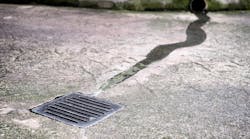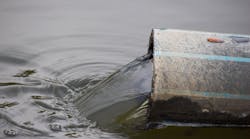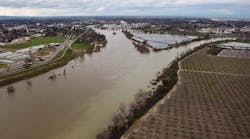BOSTON, MA, Aug. 25, 2010 -- Under the terms of a Consent Decree lodged in federal court, the City of Revere, Mass. will significantly reduce illegal discharges of raw sewage overflows into the environment from its wastewater collection system and separate storm sewer system. The City has estimated that it will spend approximately $50 million to address these illegal discharges. Revere will also pay a civil penalty of $130,000 for past violations of the Clean Water Act.
The Consent Decree is the result of a federal and state enforcement action brought by the U.S. Department of Justice, on behalf of the U.S. Environmental Protection Agency, and the Massachusetts Attorney General's Office, on behalf of the Massachusetts Department of Environmental Protection (Mass DEP). The federal and state complaints claim that Revere's sanitary sewers overflowed on numerous occasions, resulting in discharges of untreated wastewater from its collection system to rivers, creeks and brooks. Revere also discharged raw sewage through its storm sewer system to those waters.
"Under this settlement, the City of Revere will undertake much needed upgrades to how they manage wastewater, resulting in significant improvements to the waters directly impacted, and to the Mystic River Watershed," said Curt Spalding, regional administrator of EPA's New England region. "This will mean a cleaner and healthier environment for the City's people and those living downstream of Revere."
Mass DEP Commissioner, Laurie Burt, said, "By agreeing to undertake a comprehensive approach that over time will eliminate the threat of untreated sewage discharges, the City of Revere has chosen to take the responsible path forward to protect public health and safety for this coastal community's residents and visitors."
The agreement will reduce discharges of untreated sewage to rivers and their tributaries that flow into Boston Harbor and Massachusetts Bay, including the Chelsea Creek, Sales Creek, Belle Isle Inlet and the Pines River. Under the terms of the settlement, Revere will also identify and remove sources of sewage from its separate storm sewer system.
Specifically, Revere will implement a comprehensive, system-wide plan to ensure that all Sanitary Sewer Overflows (SSOs) that are associated with insufficient capacity of its separate wastewater collection system are prevented within 12 years. Revere will also address discharges from its separate storm sewer system that cause or contribute to violations of water quality standards. Better water quality in the affected rivers and water bodies will enhance the fishing and recreation opportunities involving contact with these waterways in the area.
Revere's wastewater collection system and storm sewer system are designed to keep sewage and other wastewater separate from stormwater. Properly designed, operated and maintained wastewater collection systems are meant to collect and transport all of the sewage that flows into them to a publicly owned treatment works. However, discharges of raw sewage from municipal wastewater sewers can occur. These types of discharges, called SSOs, have a variety of causes, including but not limited to severe weather, improper system operation and maintenance, and vandalism.
Similarly, a separate storm sewer system is meant to carry stormwater to local rivers and streams. These storm drain networks can contain illegal connections from the sanitary sewage system. The untreated sewage from these discharges can contaminate local waters, causing serious water quality problems. Raw sewage discharges can carry bacteria, viruses, and other organisms that can cause life threatening ailments such as cholera, dysentery, infections, hepatitis, and severe gastroenteritis.
More information:
The Consent Decree, filed in the U.S. District Court for the District of Massachusetts, is subject to a 30-day public comment period and approval by the federal court. Once it is published in the Federal Register, a copy of the consent decree will be available on the Justice Department Web site at http://www.usdoj.gov/enrd/Consent_Decrees.html.
EPA's work enforcing the Clean Water Act in New England: http://epa.gov/region1/enforcement/water/index.html
###


